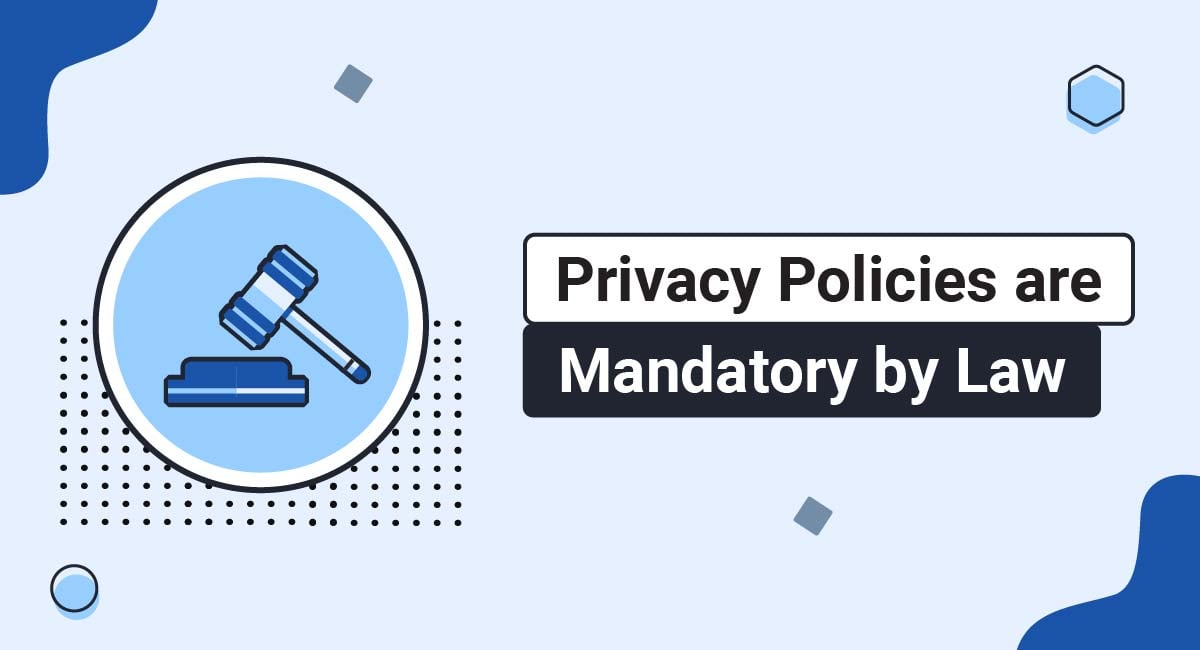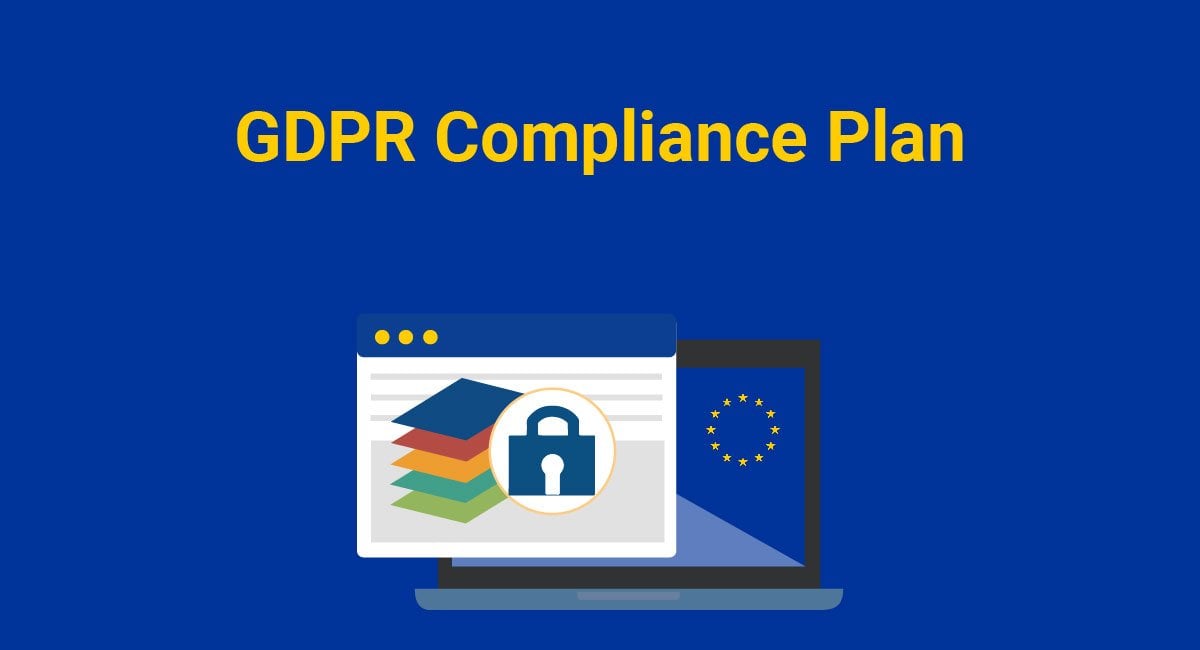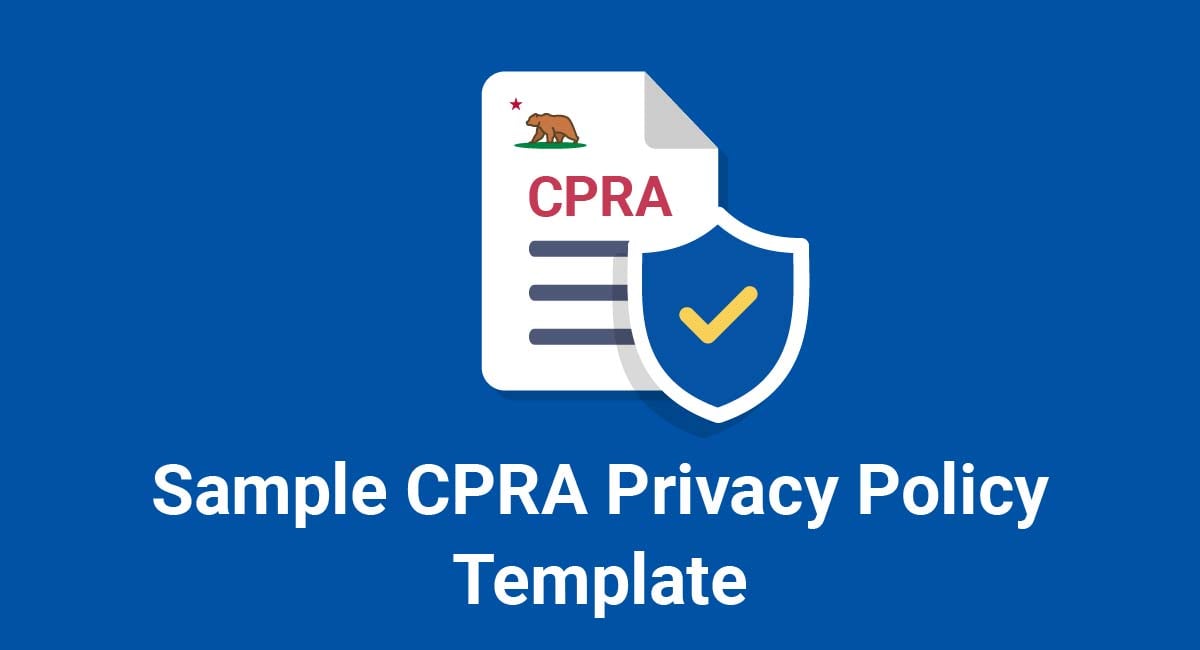Privacy Policy agreements are required by law across the world if you're collecting data that can be used to identify an individual. This is because this data is legally protected by a number of important laws around the world that require a Privacy Policy in such cases.
This article will look at some of the key global privacy laws that require a Privacy Policy.
Our Privacy Policy Generator makes it easy to create a Privacy Policy for your business. Just follow these steps:
-
At Step 1, select the Website option or App option or both.

-
Answer some questions about your website or app.

-
Answer some questions about your business.

-
Enter the email address where you'd like the Privacy Policy delivered and click "Generate."

You'll be able to instantly access and download your new Privacy Policy.
- 1. What is a Privacy Policy?
- 2. Privacy Laws That Require a Privacy Policy
- 2.1. Privacy Policy Required in the United States
- 2.2. Privacy Policy Required in Australia
- 2.3. Privacy Policy Required in the UK
- 2.4. Privacy Policy Required in Canada
- 2.5. Privacy Policy Required in the European Union (EU)
- 2.6. Privacy Policy Required in Brazil
- 2.7. Privacy Policy Required in China
- 2.8. Privacy Policy Required in Singapore, Malaysia, South Korea and Vietnam
- 2.9. Privacy Policy Requirements Elsewhere in the World
- 3. Privacy Policy Requirements From Third Parties
- 4. Summary
What is a Privacy Policy?
Privacy Policies are where you disclose your practices when it comes to your collection, use and handling of the personal data of your users. They provide information and transparency.
What kind of personal data is personal enough to identify an individual? There's a lot that can fall into that category, and here are just a few examples:
- Email addresses
- First and last names
- Shipping or billing addresses. Most ecommerce stores will need a Privacy Policy as each transaction data of a purchase will involve personal data from users.
- Social security numbers
- Birthdates
- Social media handles and profile images
Anonymous data (that doesn't include personal data) can also be classified as "personally identifiable information" if used in connection with another type of data that can result in identifying an individual. For example, some types of IP addresses are legally protected personal information under modern privacy laws.
*Editor's note: The video above has outdated content regarding EU laws. The article content is updated as of July 16, 2019. We apologize for any inconvenience this may cause.
Privacy Laws That Require a Privacy Policy
There are privacy laws in countries all around the world. Here are a few of the ones that have the farthest reach and widest impact on businesses all over the world.
Privacy Policy Required in the United States

In the U.S., at the time of writing, there are no federal laws that require a business to have a Privacy Policy (except COPPA). But there are several laws, including federal and state laws, that have provisions on data privacy.
The FTC (Federal Trade Commission) regulates data protection for all consumers in the USA, and the following laws all have privacy implications:
- The Americans With Disability Act
- The Cable Communications Policy Act of 1984
- The Children's Online Privacy Protection Act (COPPA)
- The Computer Fraud and Abuse Act of 1986
- The Computer Security Act of 1997
- The Consumer Credit Reporting Control Act
- The California Online Privacy Protection Act (CalOPPA)
- The California Consumer Privacy Act (CCPA), amended by the California Privacy Rights Act (CPRA)
- Maryland's Personal Information Protection Act (PIPA)
- Virginia's Consumer Data Protection Act (VCDPA)
- Louisiana's Database Security Breach Notification Law
- New York's Stop Hacks and Improve Electronic Data Security Act (SHIELD)
There are also biometrics laws that add a new level of protection to consumer privacy and data. Some of these laws include:
- Utah: Genetic Information Privacy Act (GIPA)
- Texas: Capture or Use of Biometric Identifier Act (CUBI)
- Arizona: HB 2478
- Oregon: Consumer Information Protection Act (OCIPA)
- Washington State: HB 1493
- Illinois: Biometric Information Privacy Act (BIPA)
The Consumer Federation of California's Education Foundation makes it clear that under CalOPPA, any operator of a commercial website or online service that collects personally identifiable information through the internet about individual consumers residing in California must have a Privacy Policy on its website:

The CCPA went into affect on January 1, 2020, with the CPRA amendments to it taking effect on January 1, 2023. It affects what certain businesses that reach California residents have to disclose in their Privacy Policies. Transparency is key here, as is granting extra rights to users when it comes to controlling what happens with their personal information.
Under the CCPA (CPRA), a business must disclose what types of personal information it collects and how it will be using each type. It must make this disclosure before collecting any personal information. This can be done by having an informative CCPA-compliant Privacy Policy.
The rights that consumers have under the CCPA (CPRA) must also be disclosed in a Privacy Policy of any business that falls under the scope of the CCPA (CPRA).
Similarly to CalOPPA, it doesn't matter if your business is incorporated or located in California when it comes to whether the CCPA (CPRA) applies. If your company reaches residents of California - which it likely does - you must have a Privacy Policy that discloses your privacy practices.
The CPRA amendment to the CCPA has some specific requirements for businesses that fall under its scope.
The CPRA expanded the requirements of the CCPA, so it comes with additional requirements and obligations.
Privacy Policy Required in Australia

In Australia, the Privacy Act 1988 is the law that governs data privacy. The Australia Privacy Act of 1988 requires companies from Australia to have a Privacy Policy.
This Act regulates the handling of personal information of individuals and mentions the collection, use, storage and disclosure of personal information.
It groups 13 Privacy Principles that each company that's required to comply with the Privacy Act should follow.
The first Privacy Principle is to have a Privacy Policy and for the Policy to be kept up-to-date.
To be compliant, the Privacy Policy must be in a format that's easy to ready, free of charge and include the following information:
- What kinds of personal information the business collects and holds
- How this information is collected and held
- Why this information is collected, held and (if applicable) disclosed to third parties
- How individuals can access and correct any personal information held about them
- How individual can complain about a breach of the Australian Privacy Principles or other binding code, and how complaints will be handled
- Whether the business is likely to disclose personal information to any overseas recipients, and if so, the countries where these recipients are likely to be located, if practical
Privacy Policy Required in the UK

The Data Protection Act 1998 (or DPA) is the law on privacy in the United Kingdom that makes a Privacy Policy mandatory.
Companies that must comply with UK's DPA act must follow the 8 principles, condensed here:
- Any kind of personal data from users must be collected in a specified and lawful way. The data also cannot be processed in any way that's incompatible with that purpose.
- The personal data you collect should be adequate, relevant and not excessive in relation to the purpose for which you're collecting the personal data.
- The personal data should be kept up to date and accurate.
- Any kind of personal data collected from users should not be kept longer than is necessary for the purpose which it was collected for.
One of the most important rights the DPA grants to residents of the UK is the right to be informed about how their data is used. This is where a Privacy Policy becomes a crucial requirement. Without it, you're violating the rights of your customers by not being informative and transparent.
If you do business in the UK, make sure you create an informative Privacy Policy that discloses at minimum:
- What personal information you collect, and under what specific lawful purpose
- How you use the data in accordance with such a purpose
- What rights users have and how they can exert them
- How long you keep data, generally
- How you keep collected data safe and secure
Privacy Policy Required in Canada

PIPEDA, the Personal Information Protection and Electronic Documents Act, is the main law of Canada for protecting user data.
PIPEDA law requires companies from Canada to have a Privacy Policy and that policy must be easy to read and understand. That means no legal jargon and overly-complicated clauses.
Under PIPEDA, personal information means:
any identifiable information about an individual whether recorded or not and it applies to the collection, use, and disclosure of personal information by organizations during commercial activities.
Any business that falls under PIPEDA's scope is required to make information available to the public about the way it handles personal information.
According to the Office of the Privacy Commissioner of Canada, having a good Privacy Policy in place is one of the most important ways a business can meet this obligation and in turn build public trust and gain customer loyalty.
Some Privacy Policy tips offered by the Privacy Commissioner include the following:
- Be very clear and specific about what your business actually does. Make sure your readers can understand what you disclose, and that you aren't just disclosing generalities. Don't use legalese, and keep it simple.
- Disclose any choices you offer when it comes to user's controlling how their personal information is used. For example, if you allow opt-outs for personal marketing, make it clear you offer this and how a user can actually opt out.
- Make it clear how users can access what personal information you have about them, and how they can request corrections or deletions of the data.
- Keep your Policy updated so it always accurately reflects your actual practices.
- Make it easy to contact you with questions.
- Make your Privacy Policy easy to find and access.
There's also the Digital Charter, which helps individuals take control over their personal information in an increasingly digital world.
Privacy Policy Required in the European Union (EU)

The General Data Protection Regulation (GDPR) regulates the processing of personal data within the European Union. This regulation has strict, global requirements for companies who have users located within the EU.
One of the main requirements of the GDPR is that you have a Privacy Policy that's easy to access and understand.
One of the main requirements of the GDPR is that you have a Privacy Policy that's easy to access and understand.
Your GDPR-compliant Privacy Policy will need to include at minimum the following information:
- What types of personal information you process
- How you process it
- Your legal basis for processing it
- How long you retain it for and what happens after the retention period
- Whether or not you share personal information with third parties
- Whether you transfer personal information overseas and if so, what safeguards you have in place
- The 8 User Rights your users have and how they can exert them
- Contact information for at least your company as well as your DPO or EU representative where applicable
Consent is huge under the GDPR, so if this regulation applies to you you'll want to get familiar with how your consent requirements will change.
Use our Cookie Consent all-in-one solution (Privacy Consent) for cookies management to comply with GDPR & CCPA/CPRA and other privacy laws:
- For GDPR, CCPA/CPRA and other privacy laws
- Apply privacy requirements based on user location
- Get consent prior to third-party scripts loading
- Works for desktop, tables and mobile devices
- Customize the appearance to match your brand style
Create your Cookie Consent banner today to comply with GDPR, CCPA/CPRA and other privacy laws:
-
Start the Privacy Consent wizard to create the Cookie Consent code by adding your website information.
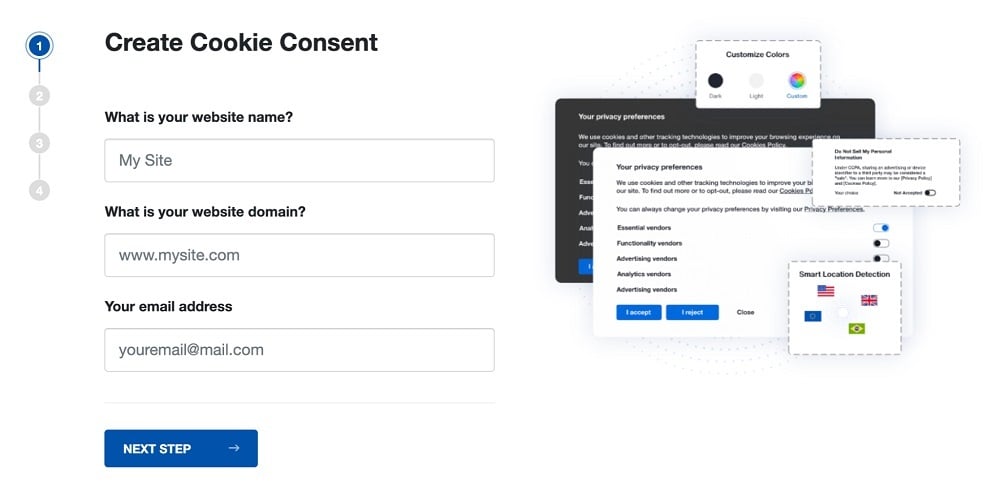
-
At Step 2, add in information about your business.
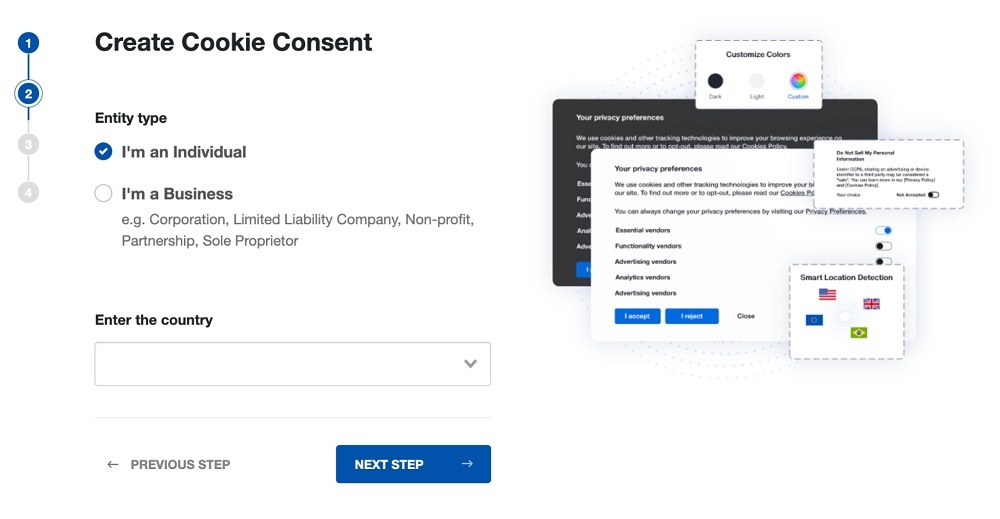
-
At Step 3, select a plan for the Cookie Consent.
-
You're done! Your Cookie Consent Banner is ready. Install the Cookie Consent banner on your website:
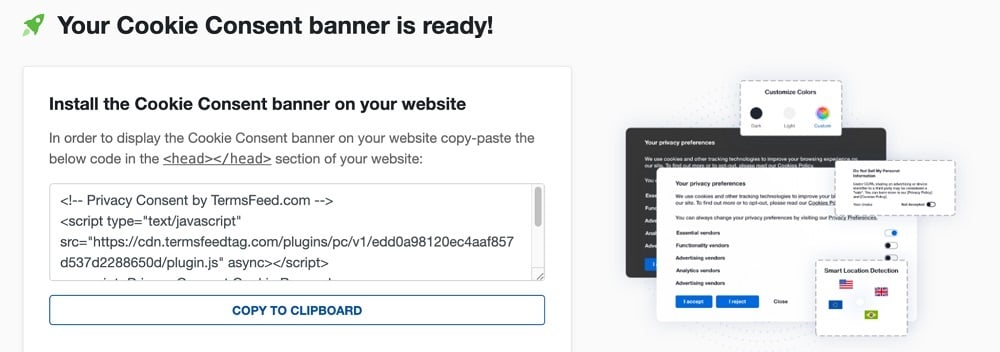
Display the Cookie Consent banner on your website by copy-paste the installation code in the
<head></head>section of your website. Instructions how to add in the code for specific platforms (WordPress, Shopify, Wix and more) are available on the Install page.
Privacy Policy Required in Brazil

Brazil's main privacy law is its Brazilian General Data Protection Law (LGPD). The LGPD affects businesses around the world if they collect personal information from people located in Brazil.
The LGPD requires disclosure of the following information via a Privacy Policy:
- Why the personal information is being processed
- Why the processing is taking place, and its duration
- The data controller's identity and contact information
- Whether the personal information will be shared, and if so, for what purposes
- What the responsibilities are of the data controllers and processors that will process the personal information
- Information about the individual's rights when it comes to their personal information
Privacy Policy Required in China

China's Personal Information Protection Law (PIPL) took effect on November 1, 2021. One of the big aspects of this law is the privacy rights it grants to individuals in China.
If you fall under the scope of the PIPL, you'll need to disclose a number of things within a Privacy Policy, including the following:
- The name and contact information for your company's personal information handler
- Information about third parties who may receive data transfers
- What rights individuals have under PIPL and how to exercise them
- What types of personal information you collect, why you collect it, how you store it, and for how long
Privacy Policy Required in Singapore, Malaysia, South Korea and Vietnam

In Southeast Asia, various national laws require companies to have a Privacy Policy agreement. Some of these laws include the following:
- In Singapore it's the Personal Data Protection Act 2012 (PDPA).
- It's also called the Personal Data Protection Act (PDPA) in Malaysia. Malaysia's PDPA Act came into force in November 2013.
- In South Korea it's called Personal Information Protection Act and it came into force in 2012.
- In Vietnam, it's Article 21 of the Law on Information Technology
Because these laws aren't quite as robust as some from the EU and the United States at the moment, you can pretty much ensure you're complying with them by making sure you comply with the requirements of the GDPR or CalOPPA.
Privacy Policy Requirements Elsewhere in the World
There are a number of other countries in the world that have privacy laws that require a Privacy Policy. Check out our article "Privacy Laws by Country" to see some of the other laws, as well as get a more comprehensive look at some of the laws mentioned above.
Privacy Policy Requirements From Third Parties

Third parties often require a Privacy Policy if you use their services.
For example, if your app collects personal information, the following third-party privacy requirements will apply:
All iOS apps need a Privacy Policy. Apple's App Store Review Guidelines explicitly states this:
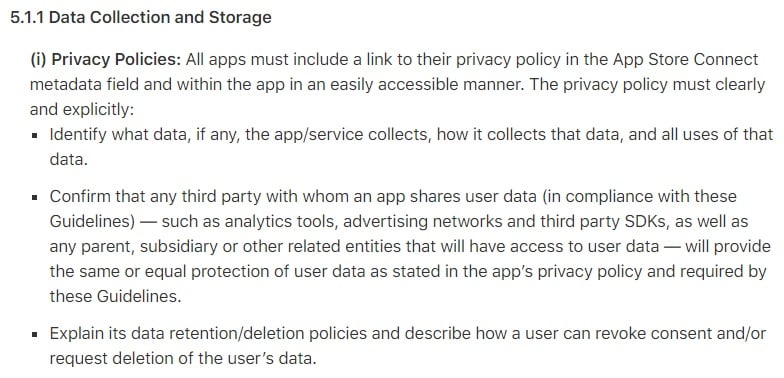
Android Apps have the same requirement for having a Privacy Policy. The Developer Distribution Agreement from the Google Play Store requires you to have privacy procedures and notices in place:

Even if you operate a simple website and only use Google Analytics, you'll still need a Privacy Policy. The Google Analytics Terms of Service requires all users of Analytics to have a Privacy Policy in place:

Facebook's Platform Policy for Developers requires you to have a Privacy Policy for Facebook apps you may develop:
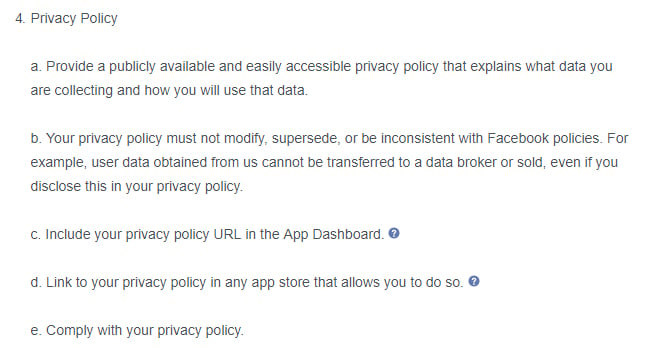
If you use Login with Amazon, Amazon's Developer Guide for Websites requires that you have a Privacy Policy available before you can use the sign-in functionality:
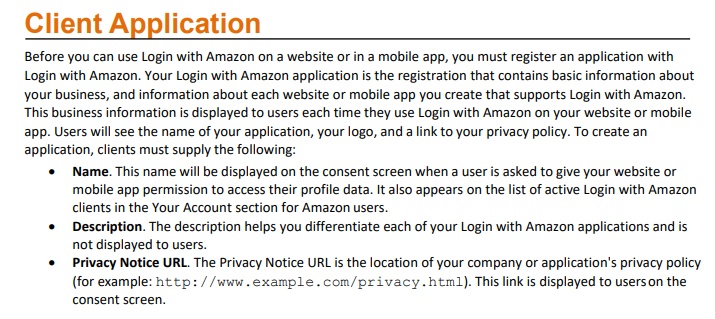
If a third party service doesn't explicitly require you to have a Privacy Policy in order to use the service, you can be sure that there's some sort of clause in place in the Terms of Use that requires you to follow all applicable laws when using the service.
If your website or app collects personal information and triggers one of the privacy laws out there that require a Privacy Policy, that clause will require you to follow that law in order to use the service. It's a roundabout but effective way to demand compliance.
In some cases, even if you don't collect any personal information, a third-party service may still require you to include a Privacy Policy that states this fact, just for transparency.
You need to become aware of the laws that protect your users, wherever they're located. Make sure to read and review any Terms and Conditions or Terms of Use agreements to find out any third-party requirements for the services your website or app may utilize.
Summary
*Editor's note: The presentation above has outdated content regarding EU laws. The article content is updated as of July 16, 2019. We apologize for any inconvenience this may cause.
If you collect personal information from anywhere in the world, and from people located around the world, it's a virtual guarantee that you will need to have and post a Privacy Policy. If you fall under any law that requires this, you will need to create and display a compliant Privacy Policy.
Many of the laws have overlapping requirements, which means if you're compliant with one you may be compliant with another. However, you must still become aware of any jurisdictional laws you must adhere to for full compliance.

Comprehensive compliance starts with a Privacy Policy.
Comply with the law with our agreements, policies, and consent banners. Everything is included.
